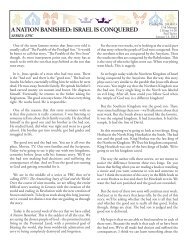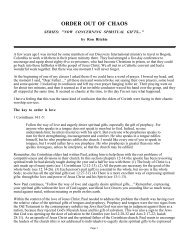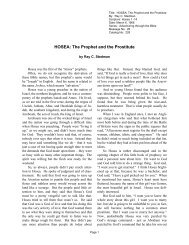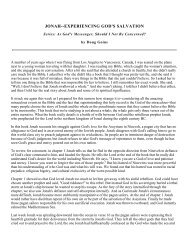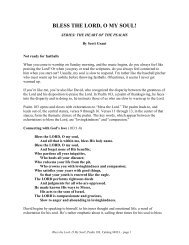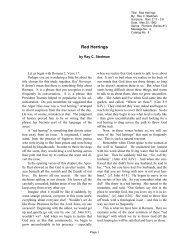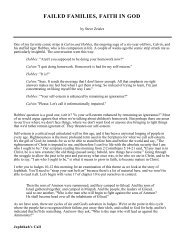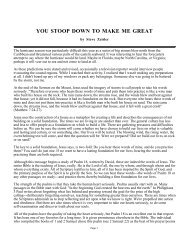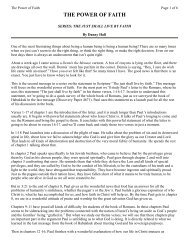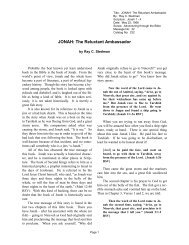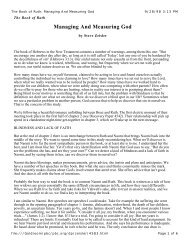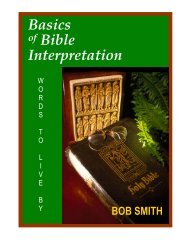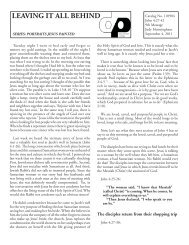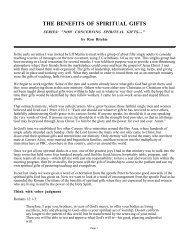Netscape: UNITY AND DIVERSITY IN THE BODY OF CHRIST
Netscape: UNITY AND DIVERSITY IN THE BODY OF CHRIST
Netscape: UNITY AND DIVERSITY IN THE BODY OF CHRIST
You also want an ePaper? Increase the reach of your titles
YUMPU automatically turns print PDFs into web optimized ePapers that Google loves.
miracles, are they? All do not have gifts of healings, do they? All do not speak with<br />
tongues, do they? All do not interpret, do they? But earnestly desire the greater gifts. And I<br />
show you a still more excellent way.<br />
Paul reminds these Corinthian believers that individually and collectively they were Christ's very body, the church for whom he<br />
died. They were one in him, and so they should be one with each other. He told them in 1:7 that they were not lacking in any<br />
spiritual gift. They were perfectly equipped to represent and serve the Lord. As a local congregation they were Christ's body in<br />
miniature, a representative of Jesus to all of Corinth. And we can claim the same truth for our own local church. We're fully<br />
equipped to serve the Lord right here, just as each of us individually is fully equipped to serve him. We each need the rest of the<br />
members around us to complement us, to support us and reinforce us, but we each have received "every spiritual blessing"<br />
(Ephesians 1:3) that we need to serve the Lord. So if there is any sense of lack or deficiency, it has to do with our perception of<br />
the reality, and our unwillingness to use what he has provided for us.<br />
Paul reviews the spiritual gifts, some of which we looked at in verses 8-11. Again this focuses on God's perfect provision for the<br />
church, knowing what is best for the church. (If you'd like to know more about spiritual gifts, you may want to read Ron<br />
Ritchie's series Now Concerning Spiritual Gifts (Discovery Papers 4476-4481)<br />
Let's quickly summarize the gifts that are mentioned in this section. Paul talks about the gift of apostleship. The original apostles<br />
were the church-planters, the foundation on which God built the church. They were eyewitnesses to the resurrection of Jesus<br />
Christ. They had been personally commissioned, sent forth by Christ to plant the church, to write Scriptures, to formulate<br />
doctrine, and their apostolic authority in that setting was attested by signs and wonders, which Paul calls "the signs of a true<br />
apostle" (2 Corinthians 12:12). Today we don't have any apostles. But we do have men and women with the same kind of<br />
pioneering spirit as church-planters and missionaries who break through new frontiers for God. It's that same apostolic spirit at<br />
work. The church still needs that influence today.<br />
The gift of prophecy is mentioned in verses 28-29. We looked at this gift in the last message, and we're going to spend more time<br />
on it when we come to chapter 14.<br />
The gift of teaching is mentioned for the first time in verses 28-29. The gift of teaching is always related to the feeding of a local<br />
body of believers with expository teaching of the Scriptures. The New-Testament pattern is one in which there are many teachers<br />
in any given church. I'm so grateful for men and women here at PBC who are spiritually gifted as teachers of the word of God and<br />
who feed us on a regular basis.<br />
In the last message we talked about the sign gifts: the effecting of miracles and gifts of healing.<br />
In verse 28 there is a new gift: administrations, or governing. This is the only place it's mentioned in all of Paul's listings. The<br />
word translated "administrations" was used literally to define the helmsman of a big commercial cargo vessel, the pilot who guided<br />
or steered the ship. It means directing the life and order of a congregation. This kind of leadership becomes very important when a<br />
church is going through rough waters. In one sense the English word administration doesn't do justice to the richness of this<br />
word, because we tend to think of administrators as paper-shufflers. This person, in contrast, pays attention to people and the good<br />
of the whole in the life of a given church.<br />
Various kinds of tongues and interpretations of tongues are mentioned. We looked at those gifts in the last message, and we'll<br />
spend more time on them in chapter 14.<br />
The rhetorical question Paul asks in verses 29-30 makes clear that no one has all the gifts, and there is no one gift that the entire<br />
church possesses. Again, God is in charge of the variety of ministries.<br />
Verse 31 simply calls us to respond, to obey: "But earnestly desire the greater gifts." This command is not addressed to individual<br />
believers, because we saw last week that each one of us is given by God what he determines is best for us and for the good of the<br />
church. It's not a matter of having gifts on demand. But collectively, as the local body of Christ, we ought to desire that the<br />
greater gifts of edification and instruction in the word be very evident among us. These are the support gifts: apostles, prophets,<br />
evangelists, teachers, and pastor-teachers. We need those gifts to be foundational in a church so that the rest of the gifts can<br />
flourish and grow and be expressed.<br />
The more excellent way, that last phrase in verse 31, introduces the context in which our gifts are to be expressed: the sacrificial<br />
way of agape love at work. We'll look at that in chapter 13.<br />
God doesn't want us to sit on our gifts. He wants us to honor one another, to serve one another, and put to work the gifts with<br />
which he has so richly endowed us.



